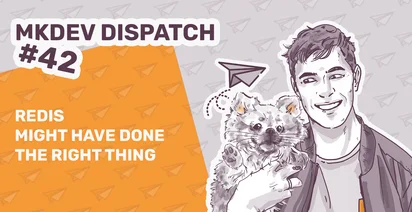Redis Might Have Done the Right Thing | ✉️ #42

Hey! 👋
I know many people are unhappy with what Redis did. Short-term, that’s a lot of turmoil and a lot of disappointment. Things like this happen, almost inevitably, when a highly popular open source software is owned by a good old profit-seeking company. There is nothing bad in companies trying to make money, but it doesn’t always mix well with the free software, licensing and those companies making money primarily from reselling that software as a managed service.
We went through this with ElasticSearch, with MySQL and, most recently, with Terraform/Hashicorp and nginx. I’d say, we have an understanding of how to deal with this situation - critical open source software should be rather governed by some foundation and never owned by a single for-profit entity. At least I can’t imagine ending up in the same situation with Kubernetes. Identifying those critical pieces of software and making sure they are guarded by some foundation and remaining as free and open as it gets should be high on the list of both big and small organizations.
The Redis Case also re-surfaces another issue, and that is - who are those people building and maintaining the software that powers the world? Sometimes it’s a company that needs to make money, sometimes it’s a couple of burned out developers who never get any money from this work, and sometimes it’s some hacker, planting backdoors into xz package. We can’t control companies taking full control over their “free” software, but we can think about the ways to better handle and govern open source, and, no less important, better compensate open source developers for the amazing work they do (and, perhaps, better examine who are those people and whether they have something bad on their minds).
And finally, as crazy as it may sound, but The Redis Case triggers something very important and vital for the technology: it fosters competition and increases technology diversity. In a matter of days we got Redis forks that will, over the next months and years, compete with Redis for the market share. And we also got other similar technologies getting more attention - in the end, Redis is not the only key-value memory store out there, and new projects and products might be built from Day 1 with another tool. More solid options and more competition is how we get better tools and technology. In this way, The Redis Case is something that we might be even happy about.
Short term, it’s frustrating, annoying, and people are disappointed. But when we stop thinking about events we don’t have control of, we can start looking into what we can control and improve, and what kind of future we want to build. And in these terms, Redis did the right thing for all of us.
What We've Shared
On our Youtube channel mknews, our news shows, gets into full speed with episode 1 (let's count the previous one as episode 0):
Linux is almost hacked, AWS forks Redis, DevOps in 2024, CloudFormation accelerates / mknews 001
DevOps Accents #34: Is DevOps capable of reshaping the healthcare industry? w/ Sergiej Soft from Caspar Health
And on the website it's an overview of GKE Enterprise by Pablo:
What We've Discovered
Conditional Love for AWS Metadata Enumeration: A security researcher from plerion figured that you can find out any tags (and other metadata) of AWS accounts with a simple script and little time - and they even offer a tool to do that!
Understanding Data Lineage in Big Data: Challenges, Solutions, and Its Impact on Data Quality. An overview of what Data Lineage is, why it is important and which open source tools can help you to implement it in your company.
The programming languages I learned in my Quantum Computing job: While you might not work with quantum computers that often, this article is worth reading to learn some new words and tools in this area.
Inside the gamedays: how we tested Signals for reliability: A great overview of practical approach to reliability and resilience testing and improvement. Organized into multiple game days, FireHydrant shows how they verified many different scenarios under different kinds of failures and system load.
Two open source projects with great documentation: Writing is one of the essential skills in IT. This walkthrough of great documentation examples can inspire you to improve your internal docs further.
A random reminder
Our Cases page is where you can find case studies of our work that might be of interest to you.
The 43rd mkdev dispatch will arrive on Friday, April 26th. See you next time!
